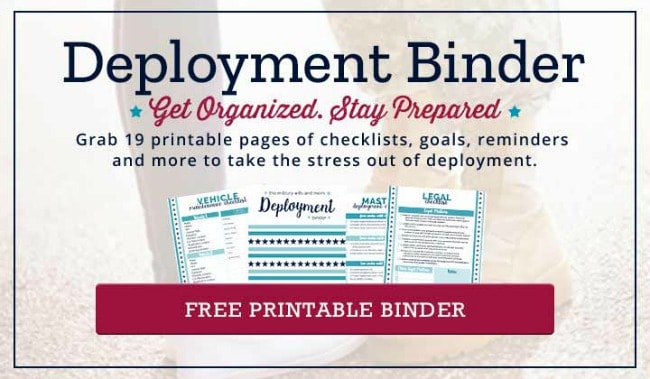Military life is stressful, which typically doesn’t mix well if you’re Type A compulsive planner (that’s me).
I like to make plans and keep plans.
The military likes to make plans and change plans.
PCS moves, deployments, and homecoming (the typical military life pillars) occur and anxiety immediately sets in. At least some of the time, I manage to demonstrate a calm attitude and self-control.
Other times, it’s hard. Moving overseas was really an Oscar performance on poorly coping with overwhelm.
And who could forget the deployment meltdown when I nearly pecked my keyboard to death writing angry emails to my loving husband (what can I say…I’m mature).
I recently reflected on the times I managed to keep my cool. I tried recognizing what was different in those situations.
I noticed a theme.
post contains affiliate links, see my disclosure here.
Why every military spouse should keep a journal.
Regardless of your military life situation, you’re going to experience stressors. And those stressors may happen when you least expect them. This only compounds the stress you experience.
Thankfully, there is one simple tool that you can use to reduce stress, solve problems more effectively, improve your communication, balance your emotions and support a strong immune system — journaling.
And…There’s a ton of science and research to back it up. Here’s the scoop…
You’ll cope better with stress.
In one study, researchers found that participants writing about traumatic, stressful or emotional events had significantly better physical and psychological outcomes compared with those who wrote about neutral topics.
Another study showed that writing about both thoughts and feelings was paramount to reducing stress through journaling. Rather than focusing only on your feelings.
When you move to a new duty station, use journaling to help you release stress and allow yourself focus on getting settled in your community.
You’ll problem solve better.
When you’re thinking through the lens of your logical brain (left side brain), it’s difficult to tap into your creative brain (right side brain), where innovative problem solving is most likely to occur.
By writing down your thoughts, emotions and ideas, you’re more likely to see problems through a broader, more creative lens. Journaling essentially helps you conquer those military life roadblocks easier than if you skipped it altogether.
When your pre-deployment to-do list seems insurmountable, turn to journaling to help you creatively find solutions.
You’ll communicate better.
Journaling naturally allows you to un-stuff all the mounds thoughts packed into your brain. By writing everything down on paper, you can articulate and organize your thoughts, creating an action plan for communication in future situations.
It’s like creating a pre-conversation map for talking to a friend or your spouse. When the real life convo happens, you’ll be able to clearly share what’s on your mind.
When long-distance friendships seem off balance, use journaling to help you find the right words to say.
You’ll see progress.
Without writing it down, your progress may seem lesser to you. It’s incredible to look back at your journal and see all the leaps you made to overcome a military life stressor or problem.
Plus, when you look back over the things you did really well—you can pick out patterns of solutions that worked! You can clearly identify those achievements and awesome moments, using them to solve future problems.
Look back to notice all those past deployments you conquered. And especially look back at past successes when you’re in the middle of a current deployment.
You’ll support your immune system.
Knowing that stress and the immune system are intricately related, it makes sense you can support your immune system through journaling (a known reducer of stress).
“University of Texas at Austin psychologist and researcher James Pennebaker argues that regular journaling strengthens immune cells.” (source)
You’ll boost emotional intelligence.
Military life is challenging and your emotions can go crazy! Journaling is an outlet for processing emotions, and it increases self-awareness. This internal familiarity allows you to make sense of the anger, frustration, anxiety or sadness during stressful times.
When you’re trying to make sense of emotions during reintegration, use journaling to find balance.
Related: The 7 Stages of Deployment Anger (And How to Manage Them)
Getting started with journaling.
1. Find a format that works for you.
You want to feel like it’s easily incorporated into your day. Paper journals are popular, but increasingly people are using computers, blogs or online writing apps to put their thoughts down.
If you’re looking for a traditional journal, here are a few I highly recommend:
- Deployment journal for spouses.
- Journal for couples (genius tool for marriage communication).
- Mother & daughter journal (strengthen your relationship).
- Deployment journal for military kids (to help kids cope).
- Journal for women (wayyyy more than just a regular journal).
2. 15-20 minutes, 3-5 times per week.
Researchers found this is the sweet spot for journaling to positively impact study participants. I also love that it’s a realistic amount of time to dedicate to journaling. Long entries are welcome, but definitely not required.
3. Include thoughts AND feelings.
Documenting only your feelings limits your ability to see the bigger picture and break through problems and challenges. Researchers found doing both were crucial to success.
4. Write freely.
You write in fragments, use bad grammar and forget everything you learned in English class. Writing freely allows your ideas to flow better and helps you access the creative part of your brain.
Looking back…
Looking back to past deployments, I noticed how much better I handled the stress when journaling was incorporated. One deployment in particular contained hundreds of journal entries.
I was astonished to read some of the things I wrote back then, and even more shocked to see how much I’ve grown since. Military life still makes me crazy (how can it not?) but at least I have a simple tool to overcome it.
Want more on military life?
- The Surprising Thing You Miss Most During Deployment
- 47 Things No One Tells You About Being a Military Wife
- One Important Tool to Make Deployment Easier
- Why Deployment Meltdowns Are Actually a Good Thing










Leave a Comment